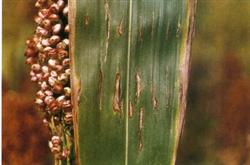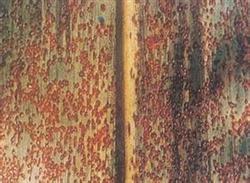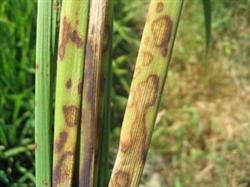Sorghum bacterial red streak

The main symptoms are damage to leaves. At first, the leaf spot showed a small, narrow, watery spot, and after expansion, it became light reddish brown. Some plaques turn brown in the center and red on the edges, and wide long oval spots appear intermittently on the stripes. Sometimes the disease spot can cover most of the leaf area. When the humidity is high, the pus of small granular bacterial seedlings can be seen to overflow and become scaly thin layer after drying. Distributed in Hebei, Henan, Shandong, Jiangsu, Hubei and other provinces. Pathogen Xanthomonas campestris pv. Holcicola (Elliott) Dye, synonym X. holcicola (Elliott) Starr et Burkholder is called Xanthomonas campestris var. sorghum or Xanthomonas aeruginosa (Xanthomonas sp.). The cell is short rod-shaped, 1.05 ml 2.4 × 0.49 mi 0.9 (um), solitary, twin or short chain-shaped, capsular and spore-free. Unipolar flagella, gram-negative, aggressive. The suitable growth temperature is 28 ℃ 30 ℃, the highest 36 ℃ 37 mol, and the lowest 4 ℃. 51 ℃ died in 10 minutes. The bacteria can not only infect sorghum, but also harm millet. Transmission route and pathogenic conditions the pathogenic bacteria overwintered on the disease remains, invaded the host from the stomata, the temperature was 25 ℃, and the weather was rainy and windy, especially in the early growth stage, which was beneficial to the occurrence and expansion of the disease. Control methods (1) selection of disease-resistant varieties. (2) strengthen the management of farmland to prevent infection.
- Prev

Chemical control of sorghum rust
Symptoms Sorghum rust begins to develop around heading. Red or purple to light brown spots were formed on the leaves, and then the spots expanded with the expansion of the pathogen, and oval raised urediospores were formed on the surface of the leaves. After cracking, brown powder, namely urediospores, was exposed. In the late stage, winter spores form in situ...
- Next

Sorghum sheath blight
Symptoms of this disease are common in northern China and Taiwan, hybrid sorghum is more serious, and it also occurs in central China and southwest China. It mainly damages leaf sheaths and leaves. After the disease, water-soaked lesions were produced on the stems near the ground, and purple-red and gray-white spots were produced on the posterior leaf sheaths. In late growth or rainy and humid weather...
Related
- The first cup of black tea in spring, the flavor and history of tea gardens in Kenya, Africa
- The computer can not only choose potatoes, but also grow tea rice. AI will grow winter oolong tea champion.
- It is not only the inflated tea bitten by insects, but also engraved with the four seasons tea in Beipu.
- The Oriental Beauty Tea Festival in Zhuxian County takes the stage at the weekend to experience the plus-size feast of oil tea.
- & quot; Oriental Beauty Tea & Exploration of Emei in Hsinchu, the hometown of quot;
- The new variety of strawberry "Tainong 1" dessert is the first choice with mellow aroma. Crimson gorgeous
- History of Tea in Taiwan: from Wild Inner Mountain to Export Tea Garden
- Two types of Taiwan Oriental Beauty Black Tea won the British three-Star Award for Childhood Tea Xiang Zhang Jiaqi changed from pilot to champion tea maker.
- Banana species and varieties: the planting history of Taiwan Xianren banana and dwarf banana is long, is banana disease resistant?
- Coffee planting Technology: Qianjie Coffee from Seedling to harvesting

